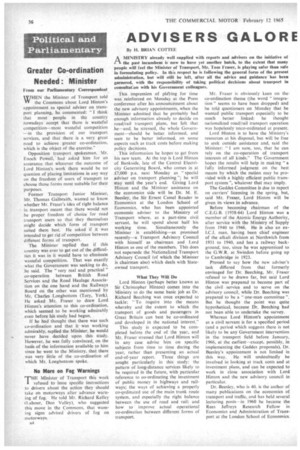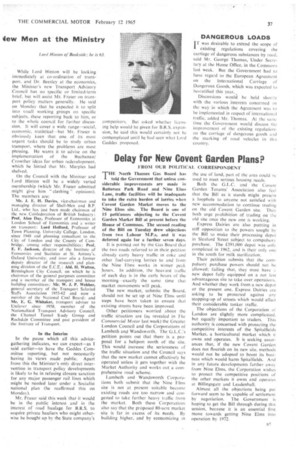ADVISERS GALORE
Page 38

Page 39

If you've noticed an error in this article please click here to report it so we can fix it.
By H. BRIAN COTTEE
AMINISTRY already well supplied with reports and advisers on the initiative of the past incumbent is now to have yet another batch, to the extent that many people will feel the Minister of Transport, Mr. Toni Fraser, is playing safer than safe in formulating policy. In this respect he is following the general form of the present administration, but will still be left, after all the advice and guidance has been garnered, oith the responsibility of taking political decisions about transport in consultat:on with his Government colleagues.
This impression of playing for time was reinforced on Monday at the Press conference after his announcement about the new advisory appointments, when the Minister admitted that he probably had enough information already to decide on road/rail transport plans, but felt that he—and, he stressed, the whole Government—should be better informed, and seen to be better informed, on some aspects such as track costs before making policy decisions.
This information he hopes to get from his new team. At the top is Lord Hinton of Bankside, late of the Central Electricity Generating Board, who comes in at £7,000 p.a. next Monday as "special adviser on transport planning "; he will stay until the year's end. Giving Lord Hinton and the Minister assistance on the economics side will be Dr. M. E. Beesley, the Sir Ernest Cassel Reader in Economics at the London School of Economics, who has been appointed economic adviser to the Ministry of Transport where, as a part-time civil servant, he will spend about half his working time. Simultaneously the Minister is establishing—as promised recently—a Transport Advisory Council with himself as chairman and Lord Hinton as one of the members. This does not supersede the Nationalized Transport Advisory Council (of which the Minister is chairman also) which deals with Stateowned transport, What They Will Do Lord Hinton (perhaps better known as Sir Christopher Hinton) comes into the Ministry to do the same basic job as Dr. Richard Beeching was once expected to tackle: To inquire into the means whereby and the extent to which the transport of goods and passengers in Great Britain can best be co-ordinated and developed in the national interest."
This study is expected to be completed before the end of the year, and Mr. Fraser stressed that Lord Hinton will in any case advise him on specific subjects from time to time during the year, rather than presenting an actual end-of-year report. Three things are sought particularly in this study: the pattern of long-distance services likely to be required in the future, with particular reference to co-ordinating the investment of public money in highways and railways; the ways of achieving a properly co-ordinated use of the main trunk route system. and especially the right balance between the use of road and rail; and how to improve actual operational co-ordination between different forms of transport. Mr. Fraser is obviously keen on the co-ordination theme (the word "integration" seems to have been dropped) and he told questioners on Monday that he wanted public transport especially to be much better linked: he thought nationalized road/rail transport operation was hopelessly unco-ordinated at present.
Lord Hinton is to have the Ministry's resources at his disposal, but will be free to seek outside assistance and, said the Minister: " I am sure, too, that he can rely on the co-operation of transport interests of all kinds." The Government hopes the results will help in making "a fully informed judgment on the best means by which the nation may be provided with a highly efficient public transport system ", whatever that may imply.
The Geddes Committee is due to report on carriers' licensing in the spring, but, said Mr. Fraser, Lord Hinton will be given its views in advance.
Before becoming chairman of the C.E.G.B. (1958-64) Lord Hinton was a member of the Atomic Energy Authority, after service with the Ministry of Supply from 1940 to 1946. He is also an exI.C.I. man, having been chief engineer of the alkali division at Northwich from 1931 to 1940, and has a railway background. too, since he was apprenticed to the G.W.R. at Swindon before going up to Cambridge in 1923.
Pressed to say how the new adviser's task differed from that formerly envisaged for Dr. Beeching, Mr. Fraser refused to be drawn far, but said Lord Hinton was prepared to become part of the civil service and to serve on the advisory council, while Dr. Beeching was prepared to he a "one-man committee ". But he thought the point was quite hypothetical, because Dr. Beeching had not been able to undertake the survey.
Whereas Lord Hinton's appointment as a civil servant is for a specified period (and a period which suggests there is not likely to be any Government intervention in the transport field before January, 1966, at the earliest—except, possibly, in implementing the Geddes proposals), Dr. Beesley's appointment is not limited in this way. He will undoubtedly be involved in looking at track costs and at investment plans, arid can be expected to work in close association with Lord Hinton and the new advisory council in particular.
Dr. Beesley, who is 40, is the author of many publications on the economics of transport and traffic, and has held several lecturing posts—in 1960 he became the Rees Jeffreys Research Fellow in Economics and Administration of Transport at the London School of Economics.
While Lord Hinton will be looking immediately at co-ordination of transport, and Dr. Beesley at the economics, the Minister's new Transport Advisory Council has no specific or limited-term brief, but will assist Mr. Fraser on transport policy matters generally. He said on Monday that he expected it to split into small working groups on specific subjects, these reporting back to him, or to the whole council for further discus. sion. It will cover a wide range-social, economic, statistical—but Mr. Fraser is obviously keen that one of its most urgent tasks should be to study urban transport, where the problems are most pressing. He wants it to advise on the implementation of the Buchanan/ Crowther ideas for urban redevelopment, which he hinted that Mr. Marples had shelved.
On the Council with the Minister and Lord Hinton will he a widely varied membership (which Mr. Fraser admitted might give him " clashing " opinions). The members are: • , Mr. J. E. H. Davies, vice-chairman and managing director of Shell-Mex and B.P, Ltd.. who has just been made chairman of the new Confederation of British Industry: Prof. Alan Day, Professor of Economics at London School of Economics and a writer on transport: Lord Holford, Professor of Town Planning. University College, London. since 1948 and planning consultant to the City of London and the County of Cambridge. among other responsibilities: Prof. F., E. Jackson, director of the Institute of Economics and Statistics at St. Antony's, Oxford University, and inter alio a former deputy director of the research and planning division of the E.C,E.; AI. If. Watton, Birmingham City Council, on which he is chairman of the general purposes committee and a member of the transport and house building committees; Mr. W. J. P. Webber, general secretary of the Transport Salaried Staffs Association 1953-62 and now a member of the National Coal Board; and Mr. E. G. Whitaker, transport adviser to Unilever since 1958. member of the Nationalized Transport Advisory Council. the Channel Tunnel Study Group and Rochdale Committee and past president of the Institute of Transport.
In the Interim In the pause which all this advicegathering indicates, we can expect—as I said earlier—to have the Geddes Committee reporting, but not necessarily having its views made public. Apart from this the Minister's only direct intervention in transport policy developments is likely to be in refusing closure sanction for any major passenger rail lines which might be needed later under a Socialist national plan (he reaffirmed this on M onda y).
Mr. Fraser said this week that it would be in the public interest and in the interest of road haulage for B.R.S. to acquire private hauliers who might otherwise be bought un by the State company's competitors. But asked whether licensing help would be given for B.R.S. expansion, he said this would certainly not be contemplated until he had seen what Lord Geddes proposed.
-DANGEROUS . LOADS I
.T was desirable to extend the scope of existing regulations covering the carriage of dangerous substances by road, said .Mr. George Thomas, Under Secretary at the Home Office, in the Commons last week. But the Government had to have regard to the European Agreement on the International Carriage of Dangerous Goods, which was expected to be•ratified this year.
Discussions would be held shortly with the various interests concerned on the way in which the Agreement was to be implemented in respect of international traffic, added Mr. Thomas. At the same time the Government would discuss the improvement of the existing regulatiore•. on the carriage of dangerous goods and the marking of road vehicles in this country.






























































































































